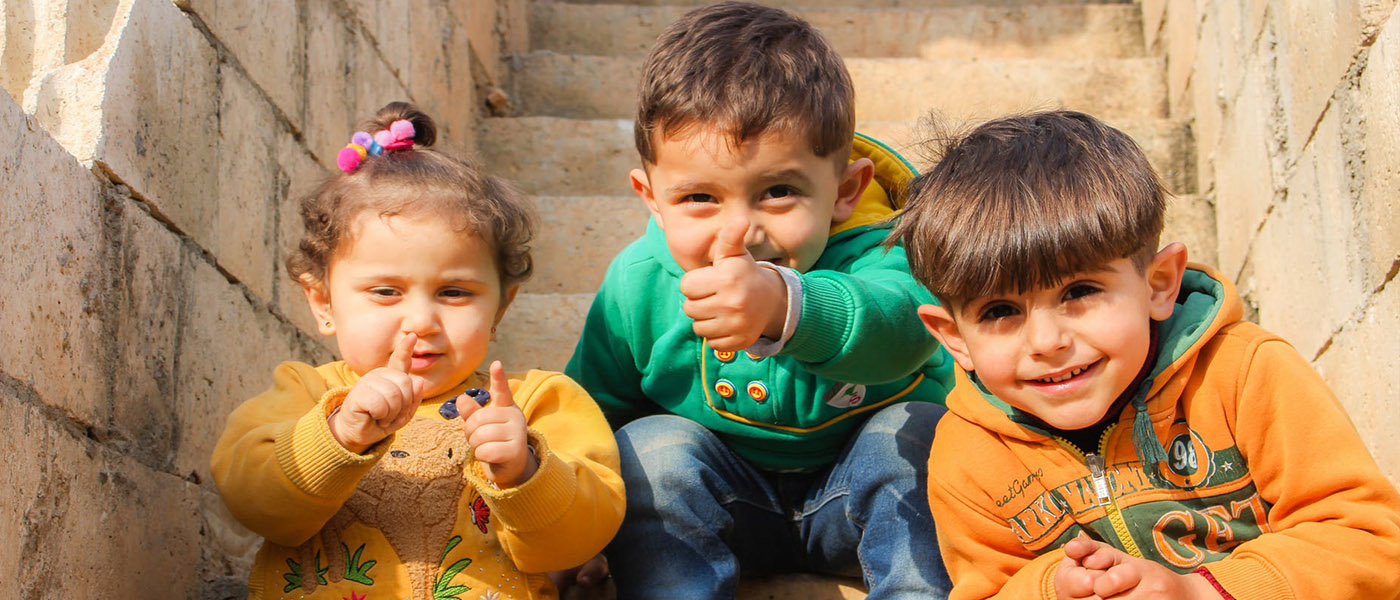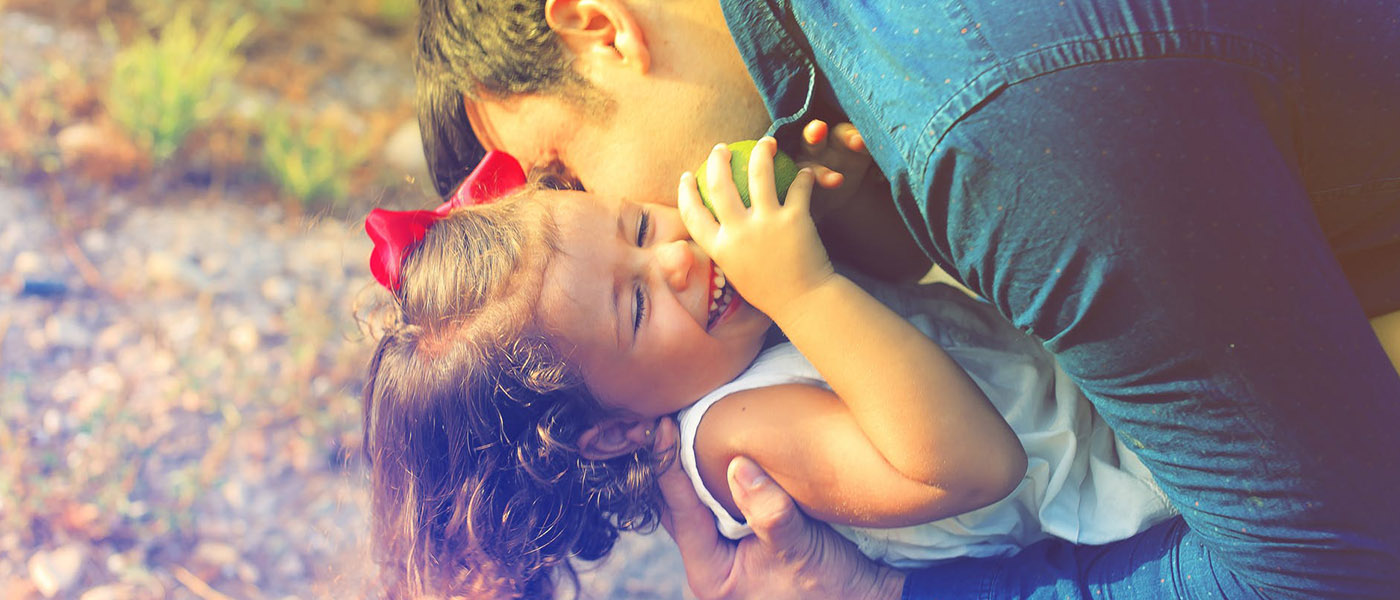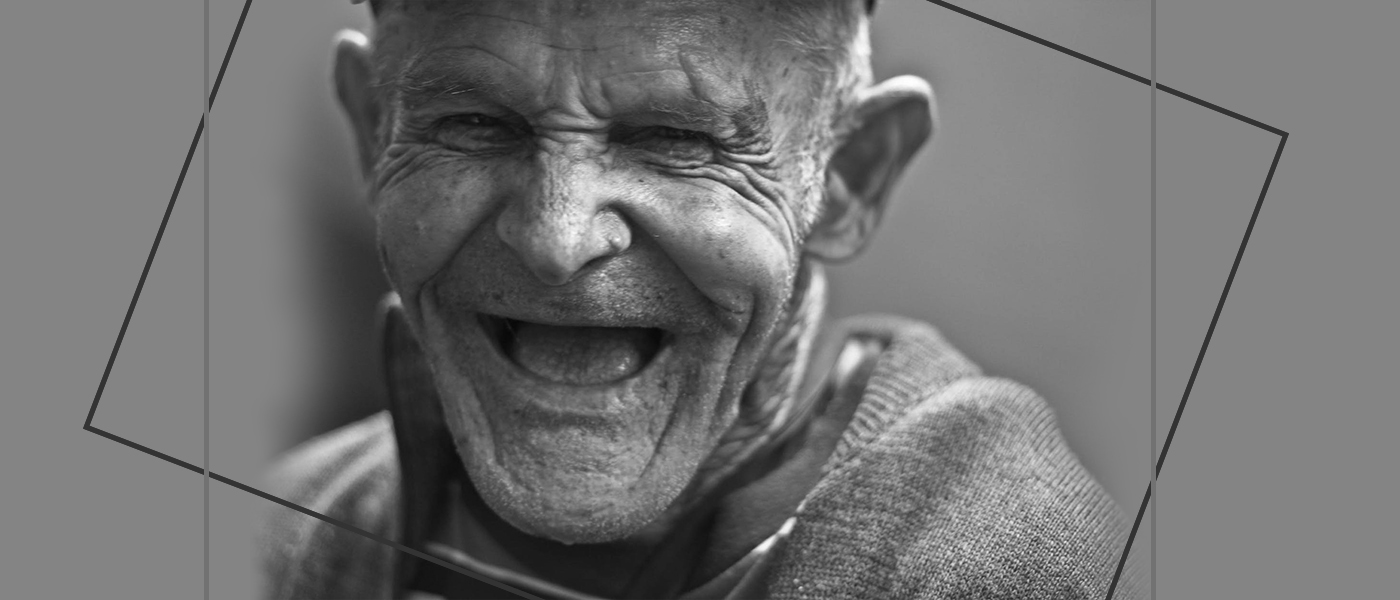

Be Kind to Children
A wealthy man went to Prophet Muhammad's (PBUH&HP) home to visit him. While they were speaking, the Holy Prophet (PBUH&HP) sat his grandchild, Hussain (AS) on his lap and started kissing him. The man was looking at the Prophet’s behavior toward the child in wonder. He said sadly “I have some children, but I have never kissed them.”
The Holy Prophet (PBUH&HP) became upset and said, “What should I do when Allah has removed mercy from your heart”.
This short story explicitly reveals Islam’s emphasis on respectful and kind behavior toward children as the builders of society’s future. This short piece of writing is going to talk about kindness to children.
We are the ones who draw the picture of our children’s lives; it is our choice to draw a beautiful or an ugly one. A child, who lives in an integrated, peaceful, and kind family, undoubtedly enjoys a more lively spirit than his other peers who do not have the opportunity to live in such families.
Psychoanalytically speaking, you might have heard a lot about the role of kindness in upbringing children, as well as its impact on their future. Now let's take a look at what Islamic leaders have said about this issue.
How can be kind to children?
If you have a child or know a child around you, you might find this saying of Imam Sadiq (AS) with regard to children interesting: “Love your children and be kind to them, and if you promise them, keep your promise, for they know nobody but you as their providers”. Imam Sadiq (AS), besides emphasizing kindness toward children, draws our attention to the importance of keeping our promise to children. As children, with their pure nature, are not yet aware of the concept of breaking promises, if the older ones commit this act, they will learn from them and copy their behavior. As a result, imitating this wrong deed will have damaging effects on the child’s spirit.
In another quote from Imam Sadiq (AS), he said: “The one who kisses his child, Allah will give him a reward in the hereafter, and the one who makes his child happy, Allah will make him happy in the resurrection day”. He also said: “Kiss your children a lot because each kiss will raise your statues in front of God”.
There are a lot of narrations and traditions about kind behavior toward children in reliable Islamic sources. In the end, it is noteworthy that the Holy Prophet (PBUH&HP) has emphasized a lot on playing with children in a very childish way as if you are a child yourself; this point of view is a modern psychological approach which our Prophet (PBUH&HP) mentioned 1400 years ago.
The holy prophet Muhammad (PBUH&HP) said: “be close and friendly to your children and hug them”.
Share This Article

What Are the Rights of Parents in Islam? Part 2
Exclusive Rights of Mothers
Imam Sajjad (AS) enumerates the rights of parents in Islam, specifically the mother in ‘Treatise On Rights (Risalat al-Huquq)’, based on her efforts, such as how she withstood the difficulties during the pregnancy, the care and protection she provided after giving birth to the baby, the selfless sacrifices she made so that her child could grow up in the most comfortable condition and with the best education.
Then, Imam (AS) invites to show gratitude to the mother, but he adds in the end that one cannot reciprocate what she had done unless God helps him to succeed [12].
Prophet Muhammad (PBUH&HP) admits that one can never (repeats this two times) pay back the rights of the mother; even if he attempts as many times as the number of the raindrops and the desert sands of the world to pay her back for only one of the days that she had carried him in her womb during the pregnancy, he will not succeed [13].
The rights of the mother among parents in Islam are even known to be superior to those of the father [14] since it is said that: “If you are performing a recommended (mustahab) prayer (which is a kind of talking with God and being in His presence requires certain reverence) and your father calls you, do not break your prayer but if your mother calls, break the prayer”[15].
In this regard, it is narrated that a man, who claimed that had committed every possible sin, asked Prophet Muhammad (PBUH) if he could still repent or not. Prophet (PBUH&HP) questioned if either of his parents was alive. He answered, his father was. Then, Prophet (PBUH&HP) advised him to go and treat him well. A while after the man left, Prophet (PBUH&HP) said: “if his mother was alive [he would certainly have the opportunity to repent]” [4].
These, along with other Quranic verses and narrations (Hadiths) highlight the importance of parents in Islam and especially mothers’ rights; something that can never be returned unless with divine providence.
Exclusive Rights of Fathers
One of the rights of the father is to recognize him as the root that has given existence to his children. Whenever one is proud of him/herself for a blessing, he/she should remember that he/she has inherited it from his/her father. Hence, one should praise God and thank him for what He has granted him [12].
Imam Reza (AS) said: “offer your property, honor, and life to your father since you have received them from him. Do good to him and ask for the blessing and forgiveness for him after his death” [16]. It is good to know that the amount of the father’s right in his child’s property is as much as it is sufficient for daily meals, without any dissipation, and only in case of need [14].
The effects of satisfying parents in Islam on their children are:
Gaining God’s satisfaction: “whoever his parents are satisfied with, I am satisfied with him/her” [17].
Long-lasting life: “Whoever honors his parents, will live a long life” [20].
Receiving good deeds from their own children: “honor your parents, so your children will honor you” [19].
Easy death: “Whoever honors the parents, God will ease his death” [21].
Being rewarded the highest levels in Heaven: “one, who gives Infaq to his parents, tolerates them, is beneficent to them and does not upset nor harm them, will be placed in the best levels of Heaven” [18].
What does Mistreating Parents in Islam Lead to?
According to Islamic teachings, not only mistreating parents in Islam is insolence to them, but also includes ignoring their rights, disobeying them in what is permissible and disrespecting them [22]. It is known from Islamic teachings that:
Even if one’s parents have done something unfair to him, he is not allowed to look at them with a sharp, angry gaze. Otherwise, even a single prayer (Salat) of him will not be accepted [24].
Insolence to parents is one of the major sins and is Haram [23].
Prophet (PBUH) has warned about the consequences of Insolence to the parents by saying that the sweet smell of heaven will be sensed from a thousand years of distance but does not reach those who have been insolent to their parents [25].
It is essential to know that one may gain the satisfaction of the parents when they are alive, but will be readily insolent to them after their death by ignoring their rights like not paying their debts, not praying for them, etc.; and the other way around [16].
Notes:
[i] (2 :83), (17:23), (4:36), (6:151), (31:13-14).
[ii] Doing prayer (Salat) and fasting (Swam) in place of parents, especially after their death, is highly advised in Islamic teachings. This is due to the importance of having respect for parents and these two Islamic practices. This also helps to maintain the emotional links between children and parents, even after their death.
[iii] Praying for parents and asking mercy on them is a duty on children that is emphasized in the Quran and Islamic narrations. If parents have committed some sins or have sometimes been disobedient, praying for them might be beneficial to them.
References:
- M. B. Majlesi, “Bihar al-Anwar,” vol. 74, p. 85.
- M. H. Tusi, "Tahdhib al-Ahkam," vol. 6, p. 350.
- A. Q. Payande, “Nahj Al-Fasahah,” T. 2963.
- parents in Islam
- M. B. Majlesi, "Mir’at al-oqul fi sharh ikhbar al-rasoul (PBUH)", vol. 8, p. 390
- M. Muhammadi Rayshahri, “The scale of wisdom: a compendium of Shi'a Hadith”, T. 6762.
- M. Muhammadi Rayshahri, “The scale of wisdom: a compendium of Shi'a Hadith”, T. 6761
- “Mutual rights of parents and children”, vol. 36, p. 86.
- Ibn Babawayh, “Al-Khisal”, p. 298.
- H. T. Nuri Ṭabarsi, “Mustadrak al-Wassail”, vol. 15, p. 198.
- M. B. Majlesi, “Bihar al-Anwar”, vol. 86, p. 359.
- Imam Zayn al-'Abidin (AS), “Treatise On Rights (Risalat al-Huquq)”.
- H. T. Nuri Ṭabarsi, “Mustadrak al-Wassail”, vol. 15, p. 203.
- A. Javadi Amoli, “Mafatih al-hayat”, p. 224.H. T. Nuri Ṭabarsi, “Mustadrak al-Wassail”, vol. 15, p. 181.
- H. T. Nuri Ṭabarsi, “Mustadrak al-Wassail”, vol. 15, p. 181.
- Ibn Babawayh,,”Fiqh al-Ridha (AS)”, p. 334.
- H. T. Nuri Ṭabarsi, “Mustadrak al-Wasail”, vol. 15, p. 176.
- [18]. Sheikh al-Mufid, “Al-Amali”, p.167.
- F. H. Tabarsi, “Mishkat ul-Anwar Fi Ghurar il-Akhbar”, p. 280.
- F. H. Tabarsi, “Mishkat ul-Anwar Fi Ghurar il-Akhbar”, p. 282.
- F. H. Tabarsi, “Mishkat ul-Anwar Fi Ghurar il-Akhbar”, p. 281.
- J. M. Khonsari, “A discription on Ghurar Al-Hikam Wa Durar Al-Kalim", vol. 1, p.548.
- A. Javadi Amoli, http://maarefquran.org/.
- H. T. Nuri Ṭabarsi, “Mustadrak al-Wasail”, vol. 15, p. 204.
- N. Makarim Shirazi, “Tafsir Nemouneh”, vol. 12, p.80.
Read More

How do Muslims treat the elderly?
Islam is a comprehensive way of life, and one of the characteristics through which it is distinguished from many other religions is that it encompasses every aspect of a Muslim’s life. Islam teaches Muslims to respect the elderly whether they are parents, relatives, or any other old person. This is because caring for the elderly in Islam is considered an important obligation through which one seeks closeness to Allah.
Status of the Elderly in Islam
There is no doubt in the special status of the elderly in Islam, as there are several texts, which urge Muslims to respect and honor them. An elderly person has a high status before Allah and His Prophet particularly if he is a believer.
In the Quran, Allah says:
“ And whomever We give a long life, We cause him to regress in creation. ; …?”(36:68)
From the verse, it is obvious that the inception of old age is a period of decline – decline comes partly from physical and partly from psychological factors. Thus, at this critical stage of life, Islam recommends adequate caring for them because they are like a prophet in a family and a blessing in the society. The Holy Prophet (PBUH&HP) said:
“The elderly among his family is like a Prophet among his community” [1]
Moreover, honoring the elderly is synonymous with honoring Allah and His Prophet. In this regards, the Holy Prophet (PBUH) was reported to have said:
“Honor the elderly because honoring them is part of honoring Allah” [2]
Meanwhile, Imam Sajjad (AS) while describing the right of the elderly in his book ‘Treatise on rights’ said:
“The right of him who is older than you is that you show reverence toward him because of his age and you honor him because he entered Islam before you. You leave off confronting him in a dispute, you do not precede him in a path, you do not go ahead of him, and you do not consider him foolish. If he should act foolishly toward you, you put up with him, and you honor him because of the right of Islam and the respect due to it”[3].
Similarly, Islam commands a Muslim to honor and respect senior citizens because honoring the elderly will guarantee the protection against every calamity on the Day of Resurrection. The Holy Prophet (PBUH&HP) said:
“Whoever honors the gray hair due to an old age, Allah will definitely save him from the panic of the Day of Judgment”[4].
Manners of Handling the Elderly in Islam
Islam is the fountain of mercy, sentiments, and sympathy. Hence, it is not strange to see Islam paying attention to the elderly and instructing a Muslim to give them compassion. There are texts from the Quran, the sayings of the Holy Prophet (PBUH&HP) and his pure Household (AS) on how a Muslim should treat an elderly person. These include:
Always honors and be merciful to the elderly. For respecting them is considered a form of worship in the sight of Allah while disrespecting them is absolutely rebuked, and it is against the pristine teachings of Islam.
In case of necessity, always render assistance to the elderly [5].
Consult the elderly for guidance on personal and collective decisions, for they are guides in a family and the society similar to a Prophet of God.
Never insult or scold an elderly. Because a disrespect to them is reprimanded by Allah, the Holy Prophet (PBUH&HP) and his pure Household (AS).
Allow our elderly to live with us. It is a bad habit to send them to nursing homes just because they are considered as nuisances to the society.
Conclusion
Respecting the elderly and honoring them are among the characteristics of a Muslim society. Therefore, it is expected of every Muslim to imbibe the culture of respecting old people whether they are parents, relatives or not. Likewise, we should always acknowledge and appreciate their presence within us especially our parents. The presence of the elderly either in the family or the society is a blessing from Allah. Their presence will bring peace, happiness, concord, tranquility, mercy, and reward from Allah. It is indeed an un-Islamic practice to consider our elderly a public nuisance and eject them from our midst.
References:
- Bihar al-Anwar, Vol. 72, P. 137.
- Wasail al-Shiah, Vol. 12, P. 100.
- Treaties on Rights, Right 44 (i.e. The right of the one older than you)
- Mustadrak Wasail, Vol. 8, P. 391.
- Al-Kafi, Vol. 2, P. 165; Jami at-Tirmidhi, Hadith 1919.
Read More

